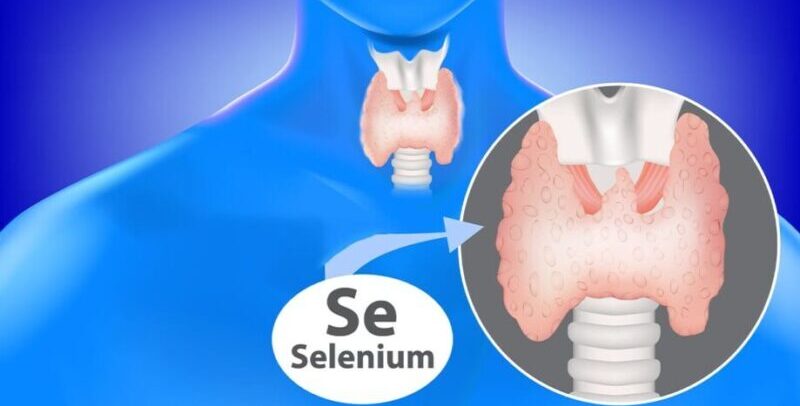Selenium And Thyroid Function
Struggling with thyroid issues can be confusing and frustrating. Selenium, a crucial trace mineral, is vital in maintaining healthy thyroid function. This article will delve into selenium’s importance for your thyroid and provide actionable advice to harness its benefits for better health.
Discover the key to thyroid balance inside.
Key Takeaways
-
- Selenium is important for your thyroid because it helps make hormones and keeps the gland healthy. Eat foods like Brazil nuts, fish, seeds, chicken, turkey, eggs, and spinach to get enough.
-
- Not having enough selenium can cause problems with your thyroid. It might lead to tiredness, weak muscles, hair loss, or serious thyroid issues.
-
- You need 55 micrograms of selenium daily if you are an adult. A doctor can do blood tests to see if you have enough selenium.
-
- Too little or too much selenium can be bad for your health. Always try to find a good balance.
-
- Zinc also matters for a healthy thyroid, just like selenium does. They work together with iodine to ensure your body produces the right hormones.
Importance of Selenium for Thyroid Health

Selenium is a crucial nutrient for maintaining thyroid health, playing a vital role in thyroid hormone metabolism. It helps to regulate the production and function of these hormones, influencing overall thyroid function and health.
Additionally, selenium has been linked to the prevention and management of various thyroid diseases, making it an essential nutrient for optimal thyroid health.
Requirements and natural sources of selenium
Your body needs selenium to keep your thyroid working well. Eating foods high in selenium is important to meet your body’s needs.
-
- Adults should aim for 55 micrograms of selenium per day.
-
- Brazil nuts are a top source. Just one or two can give you enough for the whole day.
-
- Fish like tuna, halibut, and sardines are packed with selenium.
-
- Sunflower seeds make a tasty snack, and add selenium to your diet.
-
- Chicken and turkey are good choices for meat eaters to get their dose of selenium.
-
- Eggs can help boost your intake with some selenium in each one.
-
- Spinach provides a plant-based way to add more selenium to your meals.
Role of selenium in thyroid hormone metabolism

Selenium helps your thyroid work right. It turns a less active hormone into a more active one, which your body needs to stay healthy. This nutrient is like a helper, ensuring the thyroid works well.
Our bodies use selenium to make special proteins called selenoproteins. They protect the thyroid from damage and help make important hormones. Without enough selenium, our thyroids might not work as they should, leading to health problems.
Connection with thyroid diseases
Thyroid diseases often involve problems with making and using thyroid hormones. Selenium is important because it helps the body change these hormones into a form that can be used.
Without enough selenium, the thyroid may not work right. This can lead to conditions like hypothyroidism, where the thyroid doesn’t make enough hormones, or autoimmune diseases like Hashimoto’s or Graves’ disease.
People who don’t get enough selenium might have more trouble with their thyroid gland size and function. Including enough of this nutrient in your diet could play a big part in avoiding such issues.
It’s been found that when pregnant people manage their selenium levels well, they also help control thyroid health during pregnancy.
Dual role of selenium deficiency
Selenium deficiency has a dual role in thyroid health. Firstly, it is linked to an increased risk of thyroid diseases, including autoimmune thyroiditis and underactive thyroid. Secondly, severe selenium deficiency can lead to thyroid gland dysfunction, impacting the production and regulation of thyroid hormones essential for overall well-being.
Evidence suggests that not getting enough selenium may result in higher levels of antibodies that attack the thyroid, potentially leading to chronic autoimmune conditions such as Hashimoto’s disease.
Additionally, severe selenium deficiency has been associated with impaired synthesis of thyroid hormones, paving the way for various thyroid disorders like goiter or even affecting normal functioning.
Benefits of selenium supplementation
Supplementing with selenium can benefit thyroid health by protecting the gland from oxidative damage and supporting proper hormone production. Research shows that selenium supplements may slow the progression of Graves’ orbitopathy, improving the quality of life for those with thyroid diseases.
Furthermore, selenium’s antioxidant properties offer cognitive support and help fight cell damage, providing overall health benefits beyond just thyroid function. It’s important to note that an appropriate balance of selenium intake is crucial, as too much selenium can adversely affect thyroid health.
Selenium supplementation is vital in maintaining optimal thyroid function and protecting against oxidative stress while supporting hormone production. Studies suggest that supplementing with selenium might delay the advancement of Graves’ orbitopathy and enhance the well-being of individuals dealing with thyroid conditions.
Symptoms and Diagnosis of Selenium Deficiency

Symptoms of selenium deficiency can include fatigue, weakness, and hair loss, while severe cases may lead to thyroid dysfunction and immune system impairment. Diagnosis is typically done through blood tests to measure the selenium levels in the body and identify any deficiencies.
Causes of selenium deficiency
Inadequate dietary intake of selenium is the main cause of selenium deficiency. Here are some factors that can lead to low levels of selenium in the body:
- Poor soil quality in certain regions may result in low selenium content in crops grown there.
- Consuming processed foods, which often have reduced selenium due to refining processes.
- Medical conditions such as celiac disease or gastrointestinal disorders can hinder the absorption of selenium from food.
- Intestinal bypass surgery and other gastrointestinal procedures can reduce the body’s ability to absorb selenium from food.
- Individuals who rely heavily on locally produced food may be at risk if the region has low selenium content in its soil.
Testing and treatment options
You can test for selenium deficiency through blood tests and by checking selenium levels in your nails or scalp hair. If a doctor suspects you have a deficiency based on your symptoms and circumstances, they may recommend testing.
Getting enough selenium from dietary sources or supplements can help manage complications of autoimmune conditions and improve symptoms related to thyroid function.
If you suspect that you might have a selenium deficiency, consult with a healthcare professional to discuss testing options and potential treatments. Remember that getting enough of this essential trace element is important for supporting overall health, especially regarding thyroid function.
How to Support Thyroid Health with Selenium
To support thyroid health with selenium, it is important to meet the recommended daily intake for both men and women through natural sources or supplementation. Additionally, understanding the role of zinc in conjunction with selenium and its interaction with iodine can also aid in maintaining optimal thyroid function.
Recommended daily intake for men and women
Understanding the recommended daily intake of selenium is crucial for maintaining thyroid health and overall well-being. Below is an HTML table outlining the selenium requirements for men and women:
| Gender | Recommended Daily Intake of Selenium (mcg/day) |
| Men (Ages 19 and over) | 55 |
| Women (Ages 19 and over) | 55 |
This table indicates that men and women above 19 should aim for a selenium intake of 55 micrograms daily. Adhering to these guidelines helps ensure optimal thyroid function and reduces the risk of selenium deficiency.
The importance of zinc and selenium for thyroid health
Zinc and selenium are crucial for thyroid health. They play a key role in the metabolism of thyroid hormones, especially in women. Selenium is essential for antioxidant and proper thyroid functioning, while zinc is involved in hormone metabolism and a range of metabolic functions.
For individuals with Hashimoto’s disease, taking 30 mg of zinc daily alongside selenium may help enhance thyroid function.
Both micronutrients are important pillars for overall health. They can significantly impact various aspects of thyroid function, making it vital to ensure adequate intake through diet or supplementation to support optimal thyroid health.
How selenium works with iodine to regulate thyroid hormones
Selenium and iodine team up to keep your thyroid in balance. Selenium helps ensure the iodine in your body is used properly for making hormones. These hormones are important for regulating your metabolism and other vital functions.
Selenium and iodine play a crucial role in keeping your thyroid healthy.
When you have enough selenium, it helps regulate the amount of thyroid hormone produced by converting the inactive form of thyroid hormone (T4) into the active form (T3). This means that without enough selenium, even if you have sufficient levels of iodine, your body may struggle to produce enough thyroid hormones.
FAQs
Q: What are the benefits of selenium for thyroid function?
A: Selenium plays a crucial role in thyroid hormone synthesis and metabolism and helps protect the thyroid gland from oxidative stress. Adequate selenium levels are essential for maintaining a healthy thyroid function.
Q: How does selenium interact with iodine in relation to thyroid health?
A: Selenium and iodine work together to support normal thyroid function. Selenium is necessary for converting thyroid hormone T4 (thyroxine) to its active form T3 (triiodothyronine), while iodine is essential for producing thyroid hormones.
Q: How can I get enough selenium for optimal thyroid function?
A: Consuming a balanced diet with selenium-rich foods such as Brazil nuts, seafood, organ meats, and seeds can help ensure you get enough selenium. Additionally, selenium supplements may be an option for individuals with low selenium levels.
Q: What is the effect of selenium supplementation on thyroid function?
A: Research suggests that selenium supplementation may benefit thyroid health, particularly in individuals with low or thyroid autoimmunity levels. However, it is important to discuss supplementation with a healthcare professional.
Q: What role does selenium play in patients with Graves’ disease and hyperthyroidism?
A: Selenium supplementation has been studied for its potential to improve the clinical course of Graves’ disease and reduce the levels of thyroid antibodies in some patients with hyperthyroidism. However, individual responses may vary.
Q: Can low selenium levels lead to goiter and thyroid tissue damage?
A: Low selenium levels have been associated with an increased risk of goiter and potential damage to thyroid tissue. Adequate selenium intake may help reduce the risk of such outcomes.
Q: What is the efficacy of selenium supplementation in treating thyroid-related conditions?
A: Studies have shown that selenium supplementation may benefit thyroid health, particularly in autoimmune thyroid conditions, but further research is needed to understand its efficacy in different clinical scenarios fully.
Q: What is the relationship between serum selenium levels and thyroid hormone levels?
A: Research suggests a potential correlation between serum selenium levels and thyroid hormone levels, indicating the importance of adequate selenium status for maintaining optimal thyroid function.
Q: How does selenium supplementation influence thyroid cancer and thyroid hormone levels in patients?
A: Some studies have explored the potential role of selenium supplementation in supporting thyroid health in patients with thyroid cancer. Still, the precise effects on thyroid hormone levels may vary among individuals and require further investigation.
Q: What are the key findings from systematic reviews and meta-analyses on selenium supplementation and thyroid function?
A: Systematic reviews and meta-analyses have suggested that selenium supplementation may have the potential to modulate thyroid autoimmunity and improve thyroid function, particularly in patients with certain thyroid conditions. However, more evidence is needed to confirm these findings.

